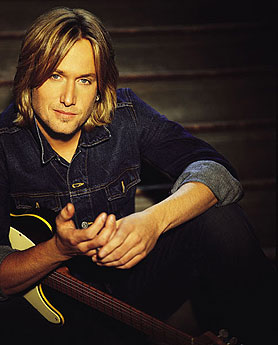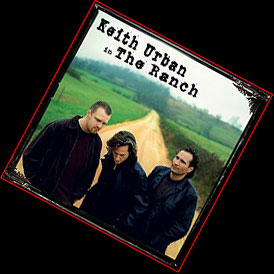
|
||
| Volume III, Issue I | Spring 2004 | |
| Spring 2004 Home Page |
| Culture, Politics & Technology |
| Fiction |
| Music |
| Poetry |
| Theater |
| About / Contact |
| Archive |
| Current Home Page |

Keith Urban's golden road
It's a long way from Queensland, Australia, to Nashville, but Keith Urban has arrived. The once skinny, mullet-wearing kid from Down Under is the newest superstar in  American country music. Urban, 35, who has Brad Pitt looks and Vince Gill talent, is a blonde triple threat who sings, writes and plays a wicked lead guitar. Deservedly, he is sitting now atop the country charts.
American country music. Urban, 35, who has Brad Pitt looks and Vince Gill talent, is a blonde triple threat who sings, writes and plays a wicked lead guitar. Deservedly, he is sitting now atop the country charts.
Urban has had seven consecutive top 10 singles, including two recent No. 1s, and recently received his first Academy of Country Music nomination as Top Male Vocalist (along with Kenny Chesney, Alan Jackson, Toby Keith and Tim McGraw). But if the truth be told, this country hunk is actually a thinly disguised rock star, in the best retro sense.
Hugely popular on country radio, Urban has a potentially wider appeal than any of his fellow country bucks, even crossover smash Chesney. A throwback to the best of '70s country-rock, Urban has undeniable rock-star charisma, and his music – from the soaring, open-road rockers to the pensive acoustic ballads – is positively reminiscent of such country-tinged but rock-leaning hitmakers as the Eagles. Urban's melodic, well-crafted music features longing vocals, piercing banjo and ripping electric guitar work, as well as smart arrangements and beautifully stacked harmonies.
And like many of his rock predecessors, Urban has been through the ringer in his personal life. He's battled cocaine addiction and depression (beating the former, still working on the latter), and last fall he ruptured a blood vessel on his right vocal cord and had to cancel much of his tour. But he's healthy now, sober, back on the road and apparently feeling grateful for his success. And while he's becoming increasingly popular outside the country music arena, he insists he's staying with his roots.
"It's funny," he told reporters recently. "Often the country audience goes, 'I don't think he's that country,' and the rock audience goes, 'Of course it's country.' It think county is really a spirit. It's just an indefinable thing you either have or your don't. I think I do."
He does. Like several Australian singers, from Olivia Newton John to Kasey Chambers, Urban grew up in Australia with parents who loved American country music. He was weaned on the songs of Charley Pride, Dolly Parton, Don Williams and Jim Reeves. He also was heavily influenced from the time he was 9 years old by the guitar genius of Mark Knopfler, which helps explain why Urban shreds on lead guitar.
That smoking '70s rock sensibility combined with a country soul has become Urban's signature style. It's a unique approach, but it's also familiar to anyone who enjoys the music of Rick Nelson, Neil Young, Glen Campbell, Craig Fuller, Charlie Daniels, Richie Furay, Buck Owens, Roger McGuinn, Gram Parsons, Jimmy Messina, Rusty Young, Paul Cotton, Randy Meisner, Jackson Browne, Don Henley, Glenn Frey,and many other artists over the past 40 years who've effortlessly mixed rock with country.
Urban's rise to fame wasn't overnight. In 1988, he formed a three-piece band whose distinctive new/old country-rock sound brought the group huge success in Australia. After charting four No. 1 country singles there, Urban made the big move to Nashville. Once in Music City, he formed another three-piece band, The Ranch, also a country-rock hybrid whose almost legendary live shows eventually led to a record deal with Capitol Nashville and a self-titled album in 1997.
 The Ranch's record was well received by critics, who noted Urban's guitar prowess. But it didn't break through commercially. Still, Urban was establishing a name for himself as a gifted musician, and eventually was asked to play guitar on such records as Garth Brooks' "Double Live" and the Dixie Chicks' "Fly."
The Ranch's record was well received by critics, who noted Urban's guitar prowess. But it didn't break through commercially. Still, Urban was establishing a name for himself as a gifted musician, and eventually was asked to play guitar on such records as Garth Brooks' "Double Live" and the Dixie Chicks' "Fly."
Urban released his debut self-titled album in 2000 on Capitol Nashville, and it didn't take long for it to strike gold. The record included radio-friendly tunes such as "It's a Love Thing," "Your Everything" and his first American No. 1 hit, "But for the Grace of God", which Urban co-wrote with Jane Wiedlin and Charlotte Caffey of the Go-Go's. Urban's debut solo release quickly catapulted him into the star ranks, and he subsequently hooked up with Brooks & Dunn on the popular duo's Neon Circus tour in early 2001 and won the Country Music Association's Horizon Award as the industry's favorite newcomer later that year.
But in 2002, Urban hit one out of the park with his follow-up album, "Golden Road," a guitar-laden album filled with terrific songs that really showcase his musical skills. The CD's first single, "Somebody Like You," which has become Urban's staple, spent six weeks at No. 1. One of the best singles in recent memory in any musical genre, "Somebody Like You" catapulted Urban from star to superstar. Another single from the album, "Who Wouldn't Want to Be Me," also a rocker, reached No. 1, as did the latest single, a poignant ballad titled "You'll Think of Me."
Urban finally seems to be enjoying the view from the top, while still managing to avoid persistent rumors of a relationship with former supermodel and fellow Nashvillian Niki Taylor, whom he continues to refer to as "just a good friend" – though they looked like a lot more than friends in Keith's video for "Somebody Like You."
But Urban is likely feeling some pressure now to match the remarkable success of "Golden Road." The new record is expected later this year, and it's one the most highly anticipated album releases in recent memory. Meantime, Urban is enjoying his success, but still wrestles with that characteristic melancholy, which informs his music, but which we hope doesn't get the best of the musician.
When asked recently by a country music reporter if he's happy, Urban replied in his still-thick Australian accent, "Yeah, relatively, Yeah." Then he paused to really consider the question. "I think so," he continued more honestly. "I walk by a piece of happiness every now and then; there it is. I think to some degree, with certain artists, there is comfort in the struggle."
![]()
Spring 2004 Music Section | Spring 2004 Main Page
Current Music Section | Current Home Page
Copyright ©
Reprinted by permission of author, who retains all copyright and control.